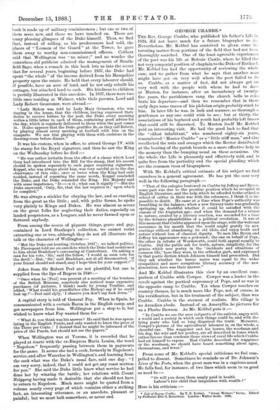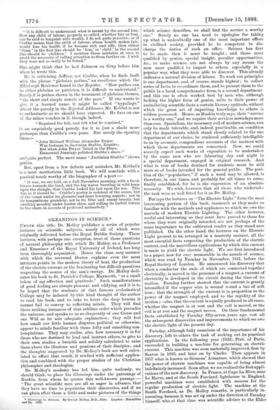GEORGE CRABBE.*
THE Rev. George Crabbe, who published his father's Life in 1834, did not leave much for a future biographer to do.
Nevertheless, Mr. Kebbel has contrived to glean some in- teresting matter from portions of the field that had not been thoroughly searched. One of the least agreeable experiences
of the poet was his life at Belvoir Castle, where he filled the not very congenial position of chaplain to the Duke of Rutland. Mr. Kebbel has had the opportunity of reviewing the whole case, and we gather from what he says that another man
might have got on very well where the poet failed to do so. Crabbe, as a matter of fact, did not always get on
very well with the people with whom he had to do— at Muston, for instance, after an incumbency of twenty- five years, the parishioners rang the church bells to cele- brate his departure—and then we remember that in these early days some traces of his plebeian origin probably stuck to him. In later life he was, in look and manner, as thorough a gentleman as any one could wish to see ; but at thirty, the associations of his boyhood and youth had probably left traces
that could still be discerned. To Muston itself Mr. Kebbel paid an interesting visit. He had the good luck to find that the "oldest inhabitant," who numbered eighty-six years,..
remembered " Muster Crabbe " as a " little stiff man," and also recollected the nuts and oranges which the Rector distributed at the beating of the parish bounds as a more effective help to the memory than the bumping usual on these occasions. On the whole, the Life is pleasantly and effectively told, and is. quite free from the partiality and the special pleading which are the common vices of biographers.
With Mr. Kebbel's critical estimate of his subject we find ourselves in a general agreement. He has put the case very
well in the following paragraph:— "That of the eulogies bestowed on Crabbe by Jeffrey and Byron, some part was due to the peculiar position which he occupied in English literature, and the help which he afforded to the orthodox school of critics in their war with the reformers, I think it is im- possible to doubt. He came at a time when Pope's authority was trembling in the balance; when a new literary taste was gradually springing up, doubtful whether it could be satisfied with the canons of the Augustan age ; and when the demand for a return to nature, created by a literary reaction, was seconded for a time by the delusive plausibilities of a political revolution. It was at this moment that Crabbe appeared upon the stage, with the welcome assurance in his mouth that the world might gratify its new cravings without abandoning its old idols, and enjoy truth and nature without loss of classical dignity. To men like Byron and Jeffrey his appearance was a god-send ; the one on behalf of Pope,. the other in rebuke of Wordsworth, could both appeal equally to Crabbe. Did the public ask for truth, nature, simplicity, for the genius which sees poetry in the incidents and situations of common life,' here they were, in the orthodox garb, and expressed in that poetic diction which Johnson himself had prescribed. Did they ask whether the heroic metre was equal to the wider sympathies and more scrupulous literary accuracy of the new generation, here was their answer."
And Mr. Kebbel illustrates this view by an excellent com- parison of Crabbe with Cowper. Cowper was a leader in the revolt against the poetical supremacy of Pope, and so was in the opposite camp to Crabbe. Yet when Cowper touches on country themes, he is much more like Pope, not, of course, in his versification, but in his treatment of the subject, than was
Crabbe. Crabbe is the sternest of realists. His village is no Arcadian abode. Instead of an Amaryllis, he pictures for us a Phoebe Dawson. As Mr. Kebbel puts it :—
" In Crabbe we see the sceva indignatio of the satirist, angry with a world and a society in which such things could be, and with the lying poets who had so long disguised the truth. Moreover,. Cowper's picture of the agricultural labourer is, on the whole, a cheerful one. The waggoner and his horses, the woodman and his dog, the wife and her poultry, are all described in tones which rather favour than condemn those views of rural life which Crabbe had set himself to expose. Had Crabbe described the waggoner or the woodman, we should have heard something about ague,. rheumatism, and fever."
From some of Mr. Kebbel's special criticisms we feel com- pelled to dissent. Sometimes he reminds us of Dr. Johnson's Lives of the Poets, when the great man was in a captious mood He falls foul, for instance, of two lines which seem to us good as need be :—
" Or will you deem them amply paid in health
Labour's fair child that languishes with wealth ?"
Here is his criticism :—
• Life of George Crabbe. By T. E. KebbeL "Great Writers" Series. Edited by Professor Erie S. Robertson. London : Walter Scott. 1888.
",It is difficult to understand what is meant by the second line. How any child of labour, properly so called, whether fair or foul, can be said to languish with wealth, I do not quite perceive ; or if Crabbe means that the child of labour, whom health makes fair, would lose his health if he became rich and idle, then either them' in the first line should be him,' or child' in the second line should be children.' I mention these mistakes at once to avoid the necessity of calling attention to them further on. I wish they were not so easily to be found."
One might think that he had Johnson on Gray before him when he wrote this.
He is criticising Jeffrey, not Crabbe, when he finds fault with the phrase " plebeian pathos," an excellence which the Edinburgh Reviewer found in the Register. "How pathos can be either plebeian or patrician, it is difficult to understand." Surely it is pathos shown in the treatment of plebeian themes, "the short and simple annals of the poor." If one wants to give it a learned name, it might be called " hypallage." About the parody in the Rejected Addresses, Mr. Kebbel is not so enthusiastic as we should have expected. He fixes on one of the minor touches in it, though, indeed, " Regained the felt, and felt what he regained," is an exquisitely good parody, for it is just a shade more grotesque than Crabbe's own puns. But surely the opening
lines,—
"John Richard William Alexander Dwyer Was footman to Justinian Stubbs, Esquire ; But when John Dwyer 'listed in the Blues, Emmanuel Jennings polished Stubbs's shoes:" are'quite perfect. The mere name " Justinian Stubbs " shows genius.
But, apart from a few defects and mistakes, Mr. Kebbel's is a most meritorious little book. We will conclude with a poetical touch worthy of the biographer of a poet :— " It was, we are told, on a dull November morning, with a fresh breeze towards the land, and the big waves bursting in wild foam upon the shingle, that Crabbe looked his last upon the sea. This was as it should be. Crabbe's poetry is redolent of the ocean, but of the ocean under its gloomier and more lowering aspects ; not in its tempestuous grandeur, not in its blue and sunny beauty, but swelling moodily under leaden skies, and rolling its turbid waters to the shore in accents of profound melancholy."















































 Previous page
Previous page